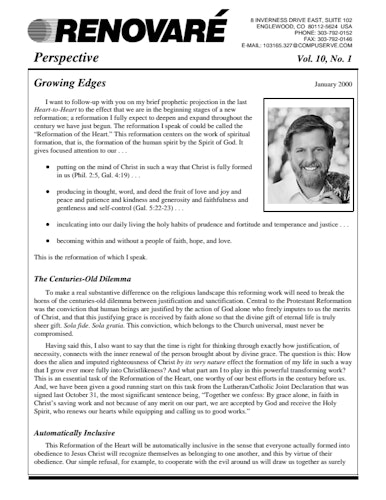I want to follow-up with you on my brief prophetic projection in the [November 1999] Heart-to-Heart to the effect that we are in the beginning stages of a new reformation; a reformation I fully expect to deepen and expand throughout the century we have just begun. The reformation I speak of could be called the “Reformation of the Heart.” This reformation centers on the work of spiritual formation, that is, the formation of the human spirit by the Spirit of God. It gives focused attention to our
… putting on the mind of Christ in such a way that Christ is fully formed in us (Phil. 2:5, Gal. 4:19)
… producing in thought, word, and deed the fruit of love and joy and peace and patience and kindness and generosity and faithfulness and gentleness and self-control (Gal. 5:22 – 23)
… inculcating into our daily living the holy habits of prudence and fortitude and temperance and justice
… becoming within and without a people of faith, hope, and love.
This is the reformation of which I speak.
The Centuries-Old Dilemma
To make a real substantive difference on the religious landscape this reforming work will need to break the horns of the centuries-old dilemma between justification and sanctification. Central to the Protestant Reformation was the conviction that human beings are justified by the action of God alone who freely imputes to us the merits of Christ, and that this justifying grace is received by faith alone so that the divine gift of eternal life is truly sheer gift. Sola fide. Sola gratia. This conviction, which belongs to the Church universal, must never be compromised.
Having said this, I also want to say that the time is right for thinking through exactly how justification, of necessity, connects with the inner renewal of the person brought about by divine grace. The question is this: How does the alien and imputed righteousness of Christ by its very nature effect the formation of my life in such a way that I grow ever more fully into Christlikeness? And what part am I to play in this powerful transforming work? This is an essential task of the Reformation of the Heart, one worthy of our best efforts in the century before us. And, we have been given a good running start on this task from the Lutheran/Catholic Joint Declaration that was signed October 31, 1999, the most significant sentence being, “Together we confess: By grace alone, in faith in Christ’s saving work and not because of any merit on our part, we are accepted by God and receive the Holy Spirit, who renews our hearts while equipping and calling us to good works.”
Automatically Inclusive
This Reformation of the Heart will be automatically inclusive in the sense that everyone actually formed into obedience to Jesus Christ will recognize themselves as belonging to one another, and this by virtue of their obedience. Our simple refusal, for example, to cooperate with the evil around us will draw us together as surelyas metal filings come together under the powerful pull of the magnet. The unity of actual obedience to Christ will overcome our differences of denomination, custom, and ritual.
For the most part we are right now governed by the cultural, social, and personal forces of disunity. But as this Reformation of the Heart deepens, we will discover that our actual obedience to Christ will move us toward unity. Like a field of sunflowers that are constantly and automatically turning toward the sun, so our obedience will be constantly and automatically turning us toward the Light of Life and we will immediately identify with one another because of the radically different kind of life – the eternal kind of life – that is flowing through us. This will happen first on a grass roots and functional level but, in time, it will have repercussions throughout the social and ecclesiastical structures of human life. This will be the ecumenism of the 21st century – “the great new fact of our time!”
Automatically Exclusive
The Reformation of the Heart (which, once again, is centered on actual obedience to Christ as a result of transformed personality) will also be automatically exclusive. Those not walking in the life and power of the Spirit are simply not a part of this spiritual fellowship. And this is seen not by what people profess but by how they live. Jesus Christ alone is able to produce living examples of his holiness, power, and love. Neither ancestral pedigree nor denominational loyalty nor creedal confession can qualify us for this living fellowship. Only changed lives – lives that are forgiven by grace and growing in grace – can bring forth the witness of the Spirit to our spirit that we are the children of God (Rom. 8:16). This, by its very nature, excludes all who stand outside. It matters not whether such persons are the dregs of society or the prim and proper of church society, if their lives lack growing formation into Christlikeness, they stand outside this living fellowship.
But, and this is the genuinely good news, “whosoever will may come.” Jesus really is “the way, the truth, and the life” which is “righteousness and peace and joy in the Holy Spirit” (Rom. 14:17). Come, you too are welcome to enter into this of life.
Growing and Deepening
But you say, “I’m far from perfect. A huge amount of transforming work would need to happen before the things you write about could be said of me!” Yes, no doubt. Paul said much the same thing (Phil. 3:12). But you are on the journey. You have decided to follow Jesus and there is no turning back. Jesus, your ever-living Teacher, will guide you in all things and in all ways. He will give you what you need: disciplines appropriate for your own training in righteousness, wisdom to know what is right and the power to do it, and, above all, grace in all things.
And, you are growing and deepening in your discipleship. You can look back and see areas of your life that have been transformed by the power of God and this gives you hope for those areas that still need a redemptive touch. You know by experience that growth in grace is actually possible, even though your progress seems torturously slow. Even in the midst of all the ups and downs, the stumbles and fumbles of life, you have come to understand that Christ can and does transform ordinary life entirely. Indeed, this is a living reality in your day-to-day walk with God. This is the Reformation of the Heart.
Peace and joy,
Richard J. Foster
From January 2000 Renovaré Perspectives Vol. 10, No. 1.
Text First Published January 2000 · Last Featured on Renovare.org June 2021



